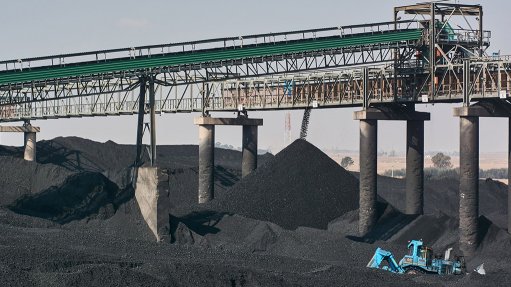
JSE-listed coal miner Thungela Resources expects to report lower earnings and cash generation for the six months ending June 30, owing to a sharp decline in coal prices and continued rail underperformance by Transnet Freight Rail (TFR).
Considering the performance of the first five months of the year, Thungela says its earnings a share for the first half of the year will likely be between R17 and R23, therefore between R44.23 and R50.23, or 66% and 75%, lower than in the first half of 2022.
Seaborne coal prices have receded from record highs in 2022 and have fallen sharply since the start of the year.
Thungela explains that, following a milder winter in Europe and softer gas prices, European coal and gas stocks continued to be elevated, resulting in the redirection of coal volumes to Asia.
This added significant supply to Asian markets, which also showed signs of weaker demand, especially from China.
Russian coal also continued to flow into the region at discounts.
Nonetheless, Thungela says, liquid natural gas prices are starting to find support, which could make coal more competitive as a fuel source towards the end of the year, as the European winter approaches.
Other short-term support factors include the impact of coal supply cuts, including lower volumes of low-grade export coal from South Africa and reduced export volumes from western Russia.
The benchmark coal price has averaged $135.47/t in the year to date, compared with a benchmark coal price average of $270.87/t in the 2022 financial year.
The discount to the benchmark coal price has been about 17% for the year to date, compared with 15% for the 2022 financial year. The average realised export price for the year to date is $112.40/t, Thungela reports, comparing it with the average realised export price of $229.21/t in the 2022 financial year.
Meanwhile, Thungela says TFR’s performance had stabilised at about 48-million tonnes a year for the industry in early May, following a weak start to the year.
This stability was, however, interrupted by two derailments in May that resulted in the loss of about 300 000 t in railed volumes for Thungela.
The company requires an industry run rate of 53-million tonnes a year to achieve the upper end of its export saleable production guidance range for the full year, which is set at 12.5-million tonnes.
Thungela and other industry stakeholders are working closely with TFR on a series of interventions to improve rail performance.
Moreover, the company reports that, while it is not materially affected by the electricity shortages in the country, this could become an area of concern should further deterioration in the supply of electricity occur.
Thungela expects to report export saleable production of 5.8-million for the first half of the year, in line with the guidance range of between 10.5-million and 12.5-million tonnes for the full year, but lower than export sale production of 6.1-million tonnes reported for the first half of the 2022 financial year.
With a net cash position of R14-billion as of May 31, Thungela continues to advance its strategic priorities, including the Zibulo North Shaft life extension project at a capital cost of R2.4-billion.
This project, together with Thungela’s investment in the Elders production replacement project, will underpin the cost competitiveness of the company going forward.
Thungela remains focused on disciplined capital allocation and is committed to paying out 30% of its adjusted operating free cash flow as a dividend.